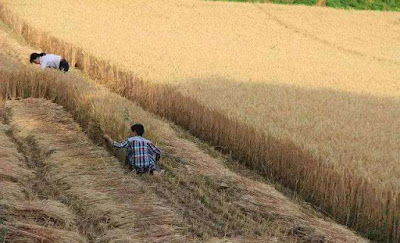In the busy season of summer harvest, how can wheat straw "stalk" as much as possible, eat "stalk" and squeeze it clean? Helou Street, Mudan District, innovatively turns waste into treasure, makes full use of straw to develop the planting and breeding industry, promotes rural revitalization through industrial revitalization, and drives farmers to increase their income.
"The surplus straw in my village is 'one-stop service'. These wheat straws will be processed by a special team organized by the street, or they will be 'packed and taken away' free of charge, or sent to the cattle farm to be used as feed. , comprehensive utilization of fertilizers, turning waste into treasure." On June 8, Su Changqing, Secretary of the Party Branch of Suqian Administrative Village, Helou Sub-district Office, Mudan District, talked about the benefits of wheat straw recycling.
A few days ago, the reporter came to the wheat field in Suqian Village and saw a crop of wheat being "swallowed into the stomach" by the harvester, threshed, smashed and evenly thrown. The rake immediately followed up and gathered the scattered wheat straws into piles, followed by the balers to collect the straws and baled them. The baled straws were placed in random order, and some bales of straws were transported to various places by transport vehicles. Some of the factories, as biomass power generation, straw substrates, and raw materials for papermaking, are transported by villagers to the cattle cooperatives in the villages. After compression, packaging and natural fermentation, they provide high-quality feed for the more than 300 beef cattle here.
Processing straw into feed not only effectively improves the quality of feed, but also greatly reduces the cost of farmers. "Using straw combined with soybean meal and other concentrated feeds to feed cattle can save more than 3,000 yuan in feed costs a year. On the other hand, it can also increase the slaughter rate, and the quality of beef is relatively stable." These days, Cui Jinrong, a major cattle farmer in Suqian Village, has been feeding straw every day. She is very busy with purchasing and storage. The 45 cows raised at home consume 400 tons of straw each year. In her eyes, the common wheat straw in the fields is "
How to deal with the manure produced by beef cattle after eating straw feed? The reporter found that in the organic fertilizer production area of the village, the manure produced by beef cattle is processed and used as fertilizer for planting surrounding crops.
Walking into the facility agriculture base of Suqian Village, 11 solar greenhouses are arranged in an orderly manner, and the tomatoes grown in the greenhouses hang like small lanterns all over the branches. The grower Su Qingzhong was busy cutting the leaves of tomatoes to transmit light, while talking about the benefits of applying organic fertilizers to vegetables.
The fertilizer used by Su Qingzhong is the organic fertilizer produced by the storage, fermentation and sterilization of cow dung in the cattle breeding base of Suqian Village. "With the use of organic fertilizer, the quality of tomatoes has improved, and the taste is also better. Now every day, vegetable buyers come to my door to talk to me about purchasing." Su Qingzhong said that according to the current market conditions, greenhouses can bring him 30,000 yuan of net income.
Wheat straw is now a sweet treat. "This year, Helou Sub-district established a cooperative relationship with Xinhao Cooperative in Mudan District. The cooperative provided professional equipment and went deep into each village (community) to promote the removal of straw from the field, which effectively solved the difficulty of farmers having nowhere to store straw, and alleviated the problems caused by straw burning. The problem of environmental pollution has also promoted the development of animal husbandry such as cattle and sheep." Zeng Qingao, an organizing committee member of Helou Sub-district Office, said that in the next step, Helou Sub-district will further play a leading role in party building, vigorously promote the comprehensive reuse of straw recycling, Find ways to make efforts to turn waste into treasure, create a "treasure pot" of resources, and help achieve both ecological and economic benefits.





No comments:
Post a Comment